Niger
The African Union suspended Niger, the scene of a coup d'état since July 26th, and told its members to avoid any action that might legitimize the junta.
The continental organization also disengaged itself from west African regional bloc ECOWAS after expressing reservations about a possible military intervention to restore President Mohamed Bazoum according to a press release issued on Tuesday.
Meeting on August 14th, the AU Peace and Security Council decided to immediately suspend the participation of the Republic of Niger from all AU activities, its organs, and institutions until the effective restoration of constitutional order in the country, according to a press release on Tuesday.
It calls on the AU Commission to "assess the economic, social and security implications" of such a deployment, while clearly stating its preference for the diplomatic route.
The PSC supports "the efforts of Ecowas in its sustained commitment to the restoration of constitutional order through diplomatic means" and affirms its "strong support for Ecowas' tireless efforts towards the peaceful restoration of constitutional order" in Niger.
And it "invites the military junta in Niger to cooperate with Ecowas and the AU with a view to the peaceful and rapid restoration of constitutional order".
It also calls on member states to "fully implement the sanctions imposed by Ecowas" against Niger, while requesting their "progressive application" and that their "disproportionate effect on the citizens of Niger" be minimized.
"Not a walk in the Park"
Following the military overthrow of President Bazoum Ecowas announced on August 10 its intention to deploy a West African force "to restore constitutional order in Niger". Details of this operation, including its date, are unknown.
Ecowas reiterates its preference for a diplomatic solution, but continues to threaten the use of force, despite dissenting voices on this very subject from within the organization.
On Friday, after a meeting of West African chiefs of staff in Accra, the Ecowas Commissioner for Political Affairs, Peace and Security, Abdel-Fatau Musah, affirmed that "the day of intervention" had been set, as had "the strategic objectives, the necessary equipment and the commitment of member states".
"If an aggression were to be undertaken against us, it would not be the walk in the park that some people believe it to be", replied to Niger's new strongman, General Abdourahamane Tiani, on Saturday, shortly after announcing a transition of three years maximum before the return of power to civilians.
Ecowas firmly rejected this timetable, announced while a West African delegation was in Niamey to seek a peaceful solution to the crisis.
"A three-year transition period is a joke. Ecowas will never accept it", said Abdel-Fatau Musah: "We want constitutional order to be restored as quickly as possible".
Among Niger's main international partners, France declared its full support for Ecowas, while the United States called for a peaceful resolution to the crisis.
Some 1,500 French and 1,100 US troops are deployed in Niger as part of the Sahel's anti-jihadist campaign.
Finally, the PSC says it "firmly rejects any external interference by an actor or country from outside the continent" (...) "including commitments by private military companies", in a likely reference to the Kremlin-linked paramilitary group Wagner, which operates notably in Mali.
Niger has become the fourth West African country to suffer a coup d'état since 2020, after Burkina Faso, Guinea, and Mali.
The coup in Niger has caused alarm among Western allies, who fear it could threaten the Trans-Saharan gas pipeline project set to link Nigeria and Algeria from 2027 to transport natural gas to Europe.
Since the overthrow of President Bazoum's regime, fears of instability in the Sahel region, which is facing growing insurgencies by jihadist groups linked to al-Qaeda and the Islamic State group, have also been mentioned.




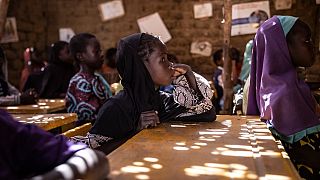
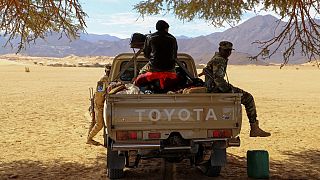
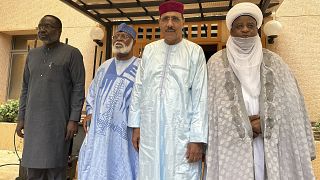
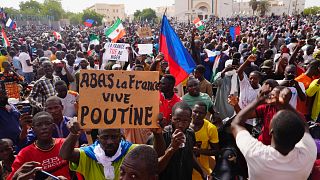
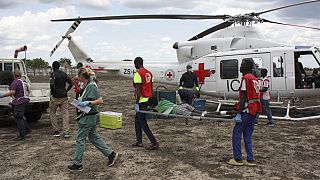
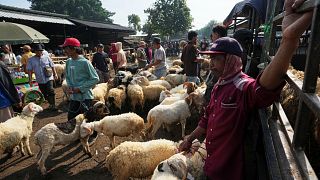



01:10
At least three killed after AU military helicopter crashes in Somalia's Mogadishu airport
11:18
Africa Day: AU renews call for reparative justice {Business Africa}
01:30
African Union expresses concern over US president's new travel ban
00:53
With sanctions lifted, Syrians are hopeful to restore Aleppo to former glory
02:00
EU and African Union ministers pledge to boost cooperation on peace, security and economy
Go to video
Khartoum accuses UAE of direct involvement in drone strikes on Port Sudan